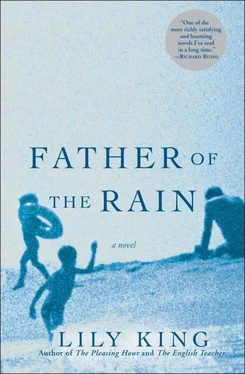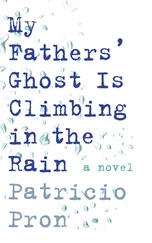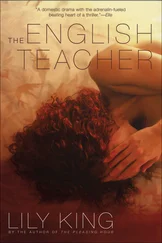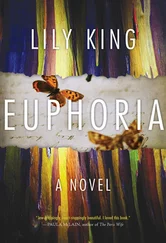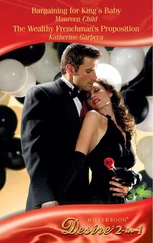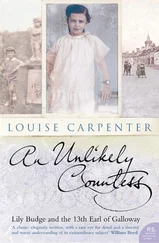My father stands against the counter with the can opener in his hand, looking at me. He looks older now, as if the years have just descended on him, as if for the first time I am seeing him not as the forty-year-old man of my youth but as the sixty-year-old man he really is. The skin beneath his eyes is dark gray, while the rest is green-gray. His eyes are bloodshot.
“Thank you, Daley. Thank you for being here.”
“You’re welcome, Dad.”
I see him glance at the clock. It’s late afternoon and he wants a drink. I cross the room to the bar. I take two bottles at a time, by their necks, to the sink. My heart is pounding, my body tensing itself, preparing for violence. But he does not strike. The can opener does not come smashing into my head as I pour all the alcohol— first the vodka, then the vermouth, then the gin, the bourbon, the scotch, and the rum — down the drain.
I make us grilled cheese sandwiches for dinner, the first time I’ve fixed him something I can eat, too. Afterwards, while my father watches the second of the Red Sox’s doubleheaders, I make some calls and locate the head of the region’s AA chapter, a man named Keith who tells me the times and locations of nearby meetings.
Then I call Jonathan.
“Hey there.” His voice is rich and happy. “How far have you got?”
He thinks I’m calling from a pay phone. He’s entirely certain I have been on the highway all day.
“I’m still in Ashing.”
“Very funny.”
“My father tried to commit suicide.”
“What?”
“We’re home now, but he’s a little shaky. I think it was more a gesture than anything else.” I listen to the silence, then say, “I have to stay for a few more days.”
“You’ve got to get yourself across the entire continent in your car.”
“I know. I’ll make it. But I think you’ll beat me out there. I’m sorry.”
“No.”
“I promised I’d stay for six more days, just to—”
“Six more days? You don’t have six more days. You have to be there on the ninth .”
“I know that. I’ll drive straight through.”
“You can’t arrive having not slept for three days. I’m coming right now and airlifting you out of there.”
“No, Jonathan.”
“I think you’ve lost your grasp on reality.”
“He promised to stop drinking.”
“Of course he did.”
“He admitted it was a problem.” Didn’t he? “He’s never done that before.”
“You are living on a big pink cloud.”
The AA meetings in Ashing are held in the rectory of the Congregational Church every evening at seven. I drive my father there the next night. I need to see him walk through the door. I need to make sure he stays there the whole hour. He’s quiet in the car as we go down the hill and through town, and the silence in the car at this time of night reminds me of the Sunday evenings when he drove me from Myrtle Street to Water Street. I pull right up to the stone path.
“This is going to be good, Dad.”
He nods and gets out of the car. He takes his long splayfooted strides up the path, a handsome well-groomed man in his light blue cotton pants and navy blazer. His hair is still damp from his shower, combed down neatly. I glance at my watch, and when I look up I see him glancing at his. Two minutes to seven. I wonder if he’ll wait out the two minutes, but when he gets to the door of the rectory, he doesn’t pause. He pushes down the brass handle and disappears. Other people come after that. A man in a T-shirt and work pants stops outside the door to finish a cigarette. Two elderly ladies come up and speak to him and then he holds the door for them and they all go in. A woman with long stringy hair comes running up five minutes late. She fixes her sandal strap while holding onto the door and then swings through.
It’s only then that I realize what an absurd amount of faith I’ve put into this idea of AA. Where did it come from? Linda Blair and that Afterschool Special? Bob Wuzzy? Julie’s uncle? I’m not sure, but it now feels like I’ve always believed that if I could just get my father through the door of an AA meeting, all would be well. But when I imagine how it must be in there, a small room with a stained carpet and the smell of old coffee grounds, metal chairs, and a motley group in a circle speaking of their feelings , I see what a complete disaster it’s going to be. I can hear Garvey laughing at me already.
I brace myself for him to come sprinting out of the building. I stare at the green door, the institutional handle, the black mat on the granite stoop. I wonder if there is another exit, if my father is already halfway home. The sky dims. Streetlights come on. A few teenagers walk by, look sidelong into the car, speak loudly. Mallory’s old piano teacher, no longer young but still brilliantly blonde with her excellent posture that we used to imitate, passes by with a limping greyhound. At 8:09 the green door swings open and a cluster of eight or ten people emerge, my father among them. Several of them shake my father’s hand. He nods goodbye to the group of them.
“Okay, let’s go,” he says before he’s all the way in the car.
I decide not to ask him about it and he volunteers nothing.
I fix him a steak and french fries for dinner. I make myself a salad with avocados and put some on his plate, though I know he won’t touch it. He is at his place at that table without a drink by his plate. It’s dinnertime and my father is not drunk.
“Good steak. You get it from Brad?”
“Brad wasn’t there. It was Will behind the counter.”
Usually any mention of Will Goodale, the third of the Goodale sons, is enough to launch him into a tirade. Will is a crook, a pig; they shouldn’t let him within twenty yards of the place. He is going to singlehandedly sink the business that his father started in 1933. Old Mr. Goodale. They don’t come any better than him. There was a gentleman. Always wore a coat and tie to work, every day. He didn’t deserve a slob like Will for a son.
But all he says is “Huh,” and returns to his steak.
I want to say encouraging things, but to make a fuss might be the wrong move.
Over his ice cream and chocolate sauce he says, “I think I’ll go over to the club tomorrow and hit a few balls.” He looks up. There is a terrible amount of despair in his face. “Do you want to come?”
“I’m sorry, Dad.” How am I going to say this without starting a fight? “I can’t go to the club.”
“Sure you can. I know you’re not a member, but you’re under the roof.”
I take in a breath. I try to speak as gently as possible. “I can’t support an institution that chooses its members based on their skin color, religion, and bank accounts.”
“All right.”
All the fight has gone out of him.
He does the dishes and goes to bed.
The next night I drive him back to the church. The woman with the stringy hair is outside smoking. My father says something that makes her smile and then goes inside. I watch her lean against the wall and blow smoke up into the trees until the library clock across the street says five past seven and she goes in, too.
I get out of the car and stand on the sidewalk. I have no idea what to do with myself. After my mother died, I started studying. I’d never really studied before, never applied myself, as my report cards in high school always suggested I do. But I worked hard my last two years in college to get into Michigan’s graduate program in anthropology, and I worked much harder there, my sights on Berkeley from the start. For so very long, my life has been about deadlines, weeks at a time indoors, nights without sleep, reading, writing, and typing. I have been a slave to professors, to students, to the computer room, to syllabi, and then to my dissertation, a behemoth at five hundred and eighty-six pages called “Spirited Play: Zapotec Children’s Understanding of Life and Death.” When I was finishing it in the spring I didn’t see anyone for twenty straight days. I stayed in the apartment of a friend who’d gone to Nagasaki for her fieldwork on the hibakusha , the “explosion-affected people.” I stocked up on rice and beans and water and chained myself to the desk. I slept in the chair, head on a book, for a few hours at a time. When I ran out of toilet paper I used a sponge, which I scalded with hot water afterward. I had only the vaguest sense that that was disgusting. At the time it felt efficient. When I was done and had defended it, Jonathan took me to the Upper Peninsula for a long weekend, but talking was difficult, and everything in the natural world seemed to be moving at an alarming velocity. The wind felt so heavy against my body, the new leaves whipping around so fast. I had a sense that some force was at work, not a neutral force but an angry, aggressive force that made me afraid of the physical world. Jonathan expected me to relax, to luxuriate, but I didn’t know how to anymore. I felt as detached and remote from my life as I had when I came back from my fieldwork in Mexico. He was patient and took me on long walks in the woods and across sandbars, and I did slowly, slowly, let down, but within a few weeks I was back on deadline, with three articles to revise for publication and a hundred final undergraduate essays to grade.
Читать дальше
